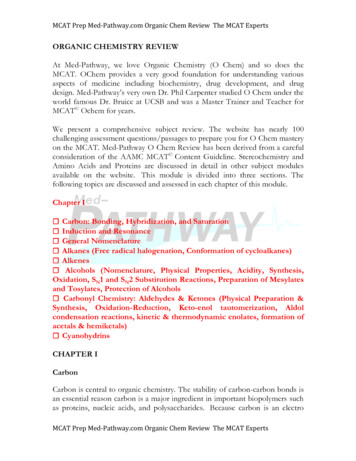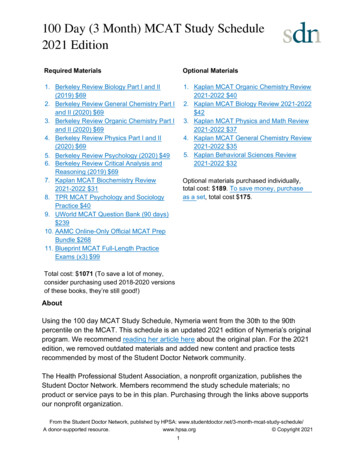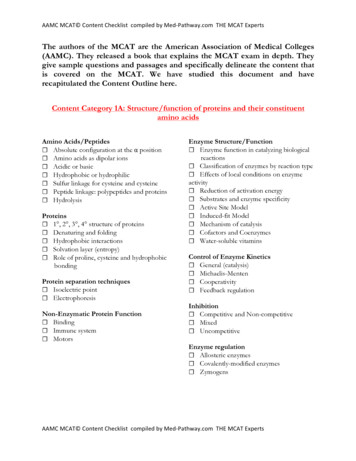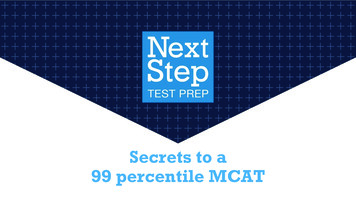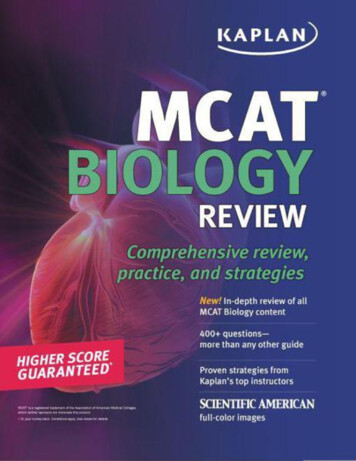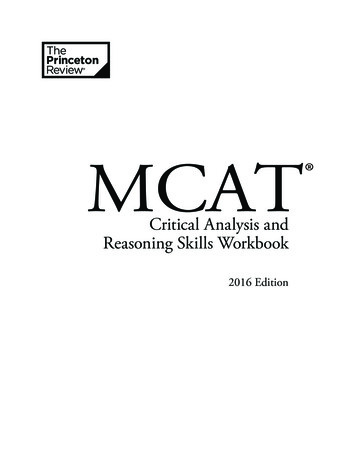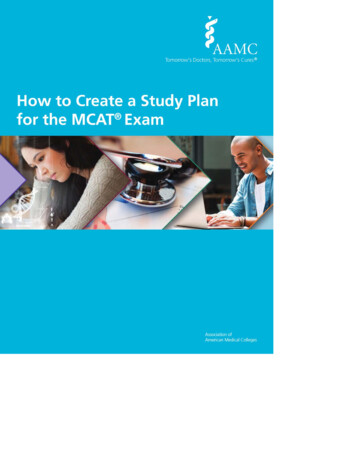
Transcription
PrefacePreparing for the Medical College Admission Test (MCAT ) takes time and dedication. Whileyou are trying to find a balance between your courses at school, work obligations, research andlabs, family and friends, and extracurricular activities, you need to find time to prepare for theMCAT exam. So it’s no surprise that one of the most frequently asked questions is, “What is thebest way to prepare for the exam?”There is no conclusive evidence about a right or wrong way to prepare, but the MCAT team atthe AAMC created this guide to help you develop your own study plan using free resources andlow-cost products. We will walk you through the six steps to creating a personalized study plan.While we can’t tell you how much time to spend preparing for the exam, we have the followingdata from the 2016 Post-MCAT Questionnaire (PMQ):Time spent preparing for the MCAT exam:Time in weeks0–8 weeks9–12 weeks13–16 weeksMore than 16 weeksPercentage of examinees28.8%30.6%17.7%22.8%Time in hours0–10 hours per week11–20 hours per week21–30 hours per weekMore than 30 hours per weekPercentage of examinees23.0%26.9%20.9%29.3%The majority (77%) of examinees studied over 11 hours per week, with 29% studying more than30 hours per week. Do remember that preparation takes time, and you should start preparingearlier rather than later.Taking the MCAT exam is one of the milestones in your path to becoming a physician, and theAAMC wants to support your journey. To do that, this guide offers helpful information in additionto the six-step Study Plan. Included in the last section, for example, are links to inspiring storiesfrom medical students and physicians who’ve overcome significant obstacles to achieve theirdreams. On days when you feel anxious or overwhelmed, stop for a moment and remindyourself of why you’re on this path. We hope that the inspiring stories will help propel youforward!
Table of ContentsThis guide walks you through six steps:1.2.3.4.5.6.Find Out Everything You Can About the ExamFigure Out Where You Stand: How Much Do You Know?Use Free and Low-Cost Resources to Help You PrepareCreate Your Study PlanStudy and PracticeCommit to a Final Rehearsal or PracticeWorksheets and blank templates accompany the guide:1.2.3.4.Sample Test WorksheetResources and Strategies WorksheetStudy Plan WorksheetStudy Plan
Step 1: Find Out Everything You Can About the Exam (2–3 days)Suppose you have a competition coming up. What would compel someone to choose you, orwhat would lead you to win or qualify? How do you size up the event? If you don’t know therules, how much time you have, nor what you must do to qualify, chances are pretty good thatyou won’t perform well.You are less likely to have opponents or adversaries when preparing for the MCAT exam, butthere are disqualifiers. You do need to know what’s on the exam, how much time you have, howthe exam is scored, when to register, and what you can/cannot bring to the test center, amongother details. For example, if the ID you bring with you on test day doesn’t match yourregistration information, you can’t sit for the exam. And if you’re not completely sure whatconcepts are going to be on the exam, all your studying may not have covered what you need toknow.So the first thing to do is find out as much as you can about the exam and know what to expect.Use the checklist below to help you take this first step.TaskFind out when the MCAT exam is administered.Check the AAMC’s MCAT testing calendarand score release dates.Find out if you qualify for fee assistance.The AAMC Fee Assistance Program providesbenefits related to exam registration, prepproducts, and application to medical school.Find out medical school application deadlines.Check the AAMC’s Applying to MedicalSchool with AMCAS website for detailedinformation.Contact your prehealth advisor or academicadvisor for guidance on when to scheduleyour exam. If you do not have an advisor,use the free Find an Advisor service providedby the National Association of Advisors forthe Health Professions to have an advisorassigned to you.Check the AAMC’s Medical SchoolAdmission Requirements (MSAR ) forU.S. and Canadian Medical Schools websitefor information on admissions andacceptance policies, MCAT and GPA ranges,tuition and education information, researchopportunities, specialty choices, and more.Subscribe or save on the purchase of aTimeneeded15-30minutesCost1 hourfree3 hours1 hourvariesfree1 hourfree1 hour 27 freeCompleted
Tasksubscription bundled with The Official Guideto Medical School Admissions print book orebook.Find out which disciplines, concepts, skills, andtopics are covered in the exam.Watch this two-minute introductory video.Go to the What’s on the MCAT Exam?resource to review the four sections, 10foundational concepts, 31 content categories,scientific inquiry and reasoning skills, andcritical analysis and reasoning skills that aretested on the exam.Read The Official Guide to the MCAT Exam. It provides extensive details, includinga timeline of things to do, information on howto register for the exam, and 120 practicequestions written by the same people whowrote the MCAT exam.Learn how your score is calculated.Visit the How Is the MCAT Exam Scored?website for frequently asked questions.Learn about MCAT logistics and requirements.The MCAT Essentials online document isrequired reading before you register for theMCAT exam. It tells you what type of ID youneed, what happens if you cancel, what youcannot bring to the test center, what triggersinvestigations, how to retake the exam, andother important information you need toknow.TimeneededCost1-2 daysvaries2 minutes2–3 hoursfreefree1–2 days 3015–30minutesfree1–3 hoursfreeCompletedNow is a good time to take a look at your financial resources. Consider how much money you’reable to spend on preparing for the MCAT exam. To make preparation as accessible as possible,we have referenced only free or low-cost resources in this Study Plan. If you need financialsupport, visit the AAMC Fee Assistance Program page for information on how to apply forbenefits. If you qualify, you will receive some MCAT prep products free of charge.If you have any questions about these resources, contact the AAMC. You can reach us at: 202-828-0600, from 9 a.m. to 7 p.m. (ET), Monday through Friday (closed Wednesdays,3–5 p.m.)mcatprep@aamc.org (MCAT exam preparation and products)
aamc.org/contactmcat (MCAT exam registration)fap@aamc.org (Fee Assistance Program)Congratulations on taking the first step! Having completed these tasks, you now have a goodidea of what disciplines are tested, what the logistical requirements are, and how you can getfinancial support.In the next step, you’ll lay the groundwork for your studies.
Step 2: Figure Out Where You Stand: How Much Do You Know? (1–2 days)Have you ever tried to give directions over the phone to a friend, relative, or delivery driver whocouldn’t identify their current location? “The GPS says I shouldn’t be any more than 10 minutesaway,” they may say. Despite their best intentions, it’s difficult to determine where they’re going,what road conditions are like, or how far they really are from their destination if they don’t knowtheir current location.This example may sound obvious to you, but in a testing situation, it’s easy to cave in to thepressure of feeling that you need to start studying as soon as possible and jump right in. Pausefor a moment and consider this: it’s difficult to determine how to prepare if you’re not sure whereyou stand or how much you know already. So start by identifying what you do know and whatyou don’t know.We recommend that you take the AAMC’s Official MCAT Sample Test or a full-length practicetest to get a baseline before you start studying. “But wait,” you may say. “I haven’t studied for ityet, and I’m not ready. My score is going to be so low that I’m only going to get discouraged.”Actually, the Sample Test provides a detailed breakdown of your correct and incorrect answers,not a scaled score. Its purpose is to help you define your starting point—to identify whichdisciplines, concepts, or skills are familiar or unfamiliar to you. While blocking out eight hours ischallenging, we recommend that you take the Sample Test in one sitting to experience whattaking the actual exam is like. Complete this task in Step 2 before proceeding any further.Task1Purchase and take the Official MCAT Sample Test.Take it in one sitting (with the same breaksyou get during the actual MCAT exam).Timeneeded8 hoursCostCompleted 25How did you do on the Sample Test?It is not typical for people taking the Sample Test to have mastered all the content. Keep in mindthat each individual brings a different set of knowledge, skills, and experiences to the table. Thetest gives you a baseline so you know what to study.Maybe you have a strong chemistry background but have never taken a psychology orsociology class. Or you’ve taken courses in all the disciplines, but you didn’t feel comfortable inthe biochemistry class you took last semester. Or your major is political science, so you havestrong analytical skills but need a stronger biology and physics foundation. Don’t panic. Beingrealistic, calm, and aware will help you gather the resources and implement strategies toacquire the knowledge and skills the exam covers.You took the Sample Test to identify your strengths and where you have gaps. We’ll show youhow to catalog those gaps so that you can gather resources to cover them in preparation for theMCAT exam.
The Sample Test gives you an honest breakdown of your knowledge so that you have a realisticview of how you need to prepare. You may not feel comfortable or confident with what you knowright now, but remember: this is just a starting point.Review your Sample Test results in detail, and catalog your correct, incorrect, and incompleteanswers.Task2Review your Official MCAT Sample Test results andcomplete the Sample Test Worksheet.Open the Sample Test Worksheet. Completethe worksheet while reviewing your SampleTest results on the e-MCAT site. We’veprovided you with an example.After logging in at e-MCAT.com, open theSample Test you just completed and select“Item Level Review Table” (third tab). Thisshows you all the questions you answeredincorrectly, as well as the questions you leftincomplete. Using the Item Level ReviewTable online at e-MCAT.com, document theFoundational Concept, Content Category,Scientific Inquiry and Reasoning Skill, andDiscipline on your Sample Test Worksheetand record how you did.Return to the questions you answeredincorrectly, and use the Why Did I Miss ThisQuestion? feature at the bottom of eachquestion to mark one of six reasons. This mayhelp you recognize patterns in your decisionmaking.On your Sample Test Worksheet, write yourconcerns and challenges in the Concernsand Challenges column. Were you hungry?Did you run out of energy or lose focus? Weresome sections really difficult or unfamiliar?Timeneeded6–9hours2-3 hoursCostfree3-4 hoursfree1 hourfree15minutesfreeCompletedfreeNow review your completed Sample Test Worksheet. You have an outline of specificfoundational concepts, content categories, and skills you need to study. You also haveinformation identifying why you missed the questions and what personal concerns you need toaddress before the exam.In the next step, you’ll gather resources and develop strategies to help you fill in the gaps andbolster the knowledge and skills you identified.
Step 3: Gather Free and Low-Cost Resources That Can Help You Prepare(4-6 hours)At this point, you may be asking yourself, “Why so much planning?”Planning helps you grasp the big picture. If you have a good plan, you know what to expect.You’ve accounted for gaps, concerns, and risks up front so that you have a plan or strategy toaddress them and avoid being blindsided. A lot of planning goes into every important event orproject, and preparing for the MCAT exam is no exception. As the old adage goes, “Failing toplan is planning to fail.” Taking the MCAT exam is a milestone in your future career, andpreparation for it should be done with great effort and attention to detail. The better preparedyou are, the more likely you will perform well.Without a plan, it’s difficult to know where you stand or how much progress you’ve made.Without a plan, it’s easy to fall prey to feelings of uncertainty and anxiety and make impulsivedecisions that undermine your confidence.So in this step, you will pull together an inventory of all the MCAT exam prep resourcesavailable to you. Important note: Your resources for studying will be somewhat different fromyour resources for practicing. Your first set of resources will be for studying content, and yoursecond set of resources will be for practicing and applying what you’ve studied.As you select your resources and strategies, remember that they should be part of an activestudy plan. This means that your plan shouldn’t consist only of passive activities (such aswatching videos); your plan should have active strategies to reinforce learning: summarizingwhat you read, explaining the concepts in your own words, and applying ideas to real-lifescenarios.Once you’ve covered content, make sure to practice applying the content. One way of doing thisis to take official practice questions to gauge your understanding and application of the conceptsyou studied. For practice questions on the various disciplines covered in the MCAT exam, theAAMC offers the AAMC MCAT Section Bank, the Official MCAT Question Packs, and theOfficial MCAT Flashcards, all of which are authored by the same people who write the MCATexam. Use these to help gauge whether you’re learning how to integrate and apply concepts inpreparation for the exam.Task12Open the Resources and Strategies Worksheet, andbrainstorm resources and strategies. List everythingyou can think of in the two columns. (A list ofexamples are provided for your reference.)Use the Sample Test Worksheet and Resourcesand Strategies Worksheet to complete your StudyPlan Worksheet. (We recommend that you printthem.)Timeneeded1 hourCost3-5 hoursfreefreeCompleted
TaskOn your Study Plan Worksheet, list the examsection, foundational concept, contentcategory, scientific inquiry and reasoning skilland/or critical analysis and reasoning skill,and discipline you want to study.Consult your Resources and StrategiesWorksheet to list all the resources andstrategies that target these areas of study.List the strategies that you can use with theresources you have.Review the SIRS (Scientific Inquiry andReasoning Skills) or CARS (Critical Analysisand Reasoning Skills) section in your StudyPlan Worksheet. Revisit the What’s on theMCAT Exam? resource to review each skillin detail and list the resources and strategiesthat will help you build those skills.SUGGESTED OFFICIAL STUDY RESOURCES(free)Khan Academy’s MCAT Collection tutorialsrelate directly to the MCAT exam contentcategories.o Revisit the What’s on the MCATExam? resource. At the bottom ofeach of the 31 content categories is alist of Khan Academy video tutorialsrelated to that category. KhanAcademy’s MCAT Collection is afree, open-access collection thatincludes more than 1,100 videos and3,000 review questions covering allcontent areas on the exam.A Roadmap to MCAT Content in Sociologyand Psychology Textbooks is a free,printable online resource that lists free orlow-cost psychology and sociologytextbooks, as well as the specific textbookchapters that cover the foundationalconcepts relating to psychology andsociology.Timeneeded1-2 hoursCost30minutes30minutes1-2 hoursVariesfreefreeCompleted
TaskA Roadmap to MCAT Content inBiochemistry Textbooks is a free, printableonline resource that lists specific chapters inlow-cost textbooks that cover thefoundational concepts relating tobiochemistry.SUGGESTED OFFICIAL PRACTICE RESOURCES(low cost)A packet of Official MCAT Flashcardsprovides you with 150 discrete questionswritten by the developers of the MCAT exam. You get 25 questions in each of thesedisciplines: biochemistry, biology, chemistry,physics, psychology, and sociology.Official MCAT Question Packs, which canbe purchased individually (120 questions) oras a bundle (720 questions), cover biology(vols. 1 and 2), chemistry, physics, andcritical analysis and reasoning (vols. 1 and2).The AAMC MCAT Section Bank consists of300 practice questions emphasizingbiochemistry, psychology, and sociology.Just like the Official MCAT Sample Testyou took earlier, all the online official AAMCpractice products come with the Why Did IMiss This Question? feature. Use thisfeature to identify patterns in your test taking.TimeneededCostCompletedfreeVariesVaries 10 15each 72bundleof six 45freeYou’ve now created a Study Plan framework! Your next step is to organize the weeks or monthsyou’ve allocated to prepare for the MCAT exam.
Step 4: Create Your Study Plan (3–5 hours)The worksheet you created in Step 3 will help you create a personalized weekly or monthlyStudy Plan.Task12Working backwards from your exam date, figure outhow much time you have to study.You’ve reviewed the MCAT testing calendarand application deadlines. Think aboutwhether you can perform well on your firsttake or need two or more takes. If you thinkyou may need two or more takes, considerscheduling the first take early enough to leavetime for additional takes during the sameAMCAS application cycle.Register for the exam if the registrationwindow is open and you feel comfortableregistering now.Create your Study Plan.Open the Study Plan.Write down all your academic, professional,and extracurricular obligations in the rowlabeled “Schedule” and how many hours eachactivity requires.Write down how many hours you haveavailable to study each day, subtracting 10hours for sleep and basic care and thenumber of hours needed for the obligationsyou listed in the task above.Identify the areas you want to study, and writethem down.Figure out how to sequence your study andpractice. Do you want to start with yourstrongest area, or do you want to alternatebetween a section you are comfortable withand a section you’re not as comfortable with?Also, remember that studying contenttypically comes before practicing theapplication of that content.Using your Study Plan Worksheet from theprevious step, write down the resources andstrategies you’ll use to study content. eeCompleted
write down the resources and strategies you’lluse to practice applying that content.Your personalized Study Plan is a living document. If, after a few weeks of studying, you findthat you need to adjust your timeline or the number of hours you’ve allocated for specificdisciplines, concepts, or skills, you should do so. If you find that the material you’ve listed is toomuch or too little for the number of days or weeks, adjust your plan accordingly.
Step 5: Study and Practice (timeframe varies)Your Study Plan should have a good mix of strategies to help you learn, integrate, and applynew concepts. After studying new concepts, make sure to give yourself opportunities to practiceand apply them. Here are some strategies you can use: Prepare a set of questions to ask yourself after watching a video or reading a textbookchapter. For example: Can I explain this to a classmate? Can I think of a real-lifeexample of this concept relevant to me or someone else? Does this differ from what Ipreviously understood and if so, why? What additional information can I seek out toenhance my understanding of this topic? Start each day with a review of what you studied or practiced during the previous day.Reviewing small chunks of information regularly will help you retain the content. Study with a partner. Assign topics to teach each other, use each other as soundingboards to think out loud, and share notes. Create questions and quiz each other. Summarize what you learned. You can use lecture notes, textbooks, and Khan Academytutorials to write summaries, compile lists, or draw compare-and-contrast charts andconcept maps. Reproduce your summaries and notes from memory to practice recalling information. Create your own flashcards and vocabulary lists. If you have questions or don’t fully understand a topic or concept, keep track of all yourquestions and check in with your professor or advisor during office hours. Join online forums to ask and answer questions about the topics and concepts.The AAMC interviewed a diverse group of examinees about how they prepared for the MCATexam. The strategies used by some of the examinees are featured in How I Prepared for theMCAT Exam. Consider the resources these individuals used, the obstacles they overcame,and the advice they’d like to offer others preparing for the exam.
Step 6: Commit to a Final Rehearsal or Practice (2 days)It has been weeks since you first took the Sample Test, and you’ve spent a lot of time preparingfor the MCAT exam. Now it’s time for your final practice, or rehearsal, before the real exam.Take another full-length practice test, this time a scored one, to see where you now stand. Asbefore, take it under the same conditions as the actual test: with the same timing and breaks, ata location outside your own home, in one sitting.After you take the practice test, think about what you want to do. Are you happy with theresults? Do you need more time to study and practice, or are you ready to take the exam?Remember, you have the option of revisiting your Study Plan and adjusting or extending itbased on your practice test results. You also have the option to retake the exam.Task123Set aside a whole day, and take a full-length practiceexam. We recommend taking the AAMC MCAT Practice Exam 1, AAMC MCAT Practice Exam 2, orAAMC MCAT Practice Exam 3, all of which are official,full-length practice tests that provide scaled scores.Select the “Simulate Actual Test” setting to testunder the same timed conditions as the actualexam.Review your scaled score report, and reflect on yourperformance.Revisit your results from the Sample Test, takenin Step 2, and assess your current performance.Write down how you feel.Determine your next course of action.“I’m happy with the results.”o You can go ahead and take the actualexam.Oro You can take another full-length practicetest to be absolutely sure you canperform the same. You can also ask youradvisor to hold a Mock Exam Day for youand your peers or hold one for yourself.Timeneeded8 hoursCost1–3daysfreeVariesfree 35Complete
TaskTimeneeded“I think I can do better.”o You can revisit the previous steps tocreate a Study Plan based on your fulllength practice test results. Considermodifying your areas of focus or addingtime and resources.o If your obstacles were physical, such asbeing tired, hungry, or unfocused, figureout a plan to address those challenges.o If you have already registered for theexam, don’t think you’ll be ready, and arewithin the registration deadline, considerrescheduling your exam. (Reschedulingfees may apply.)CostComplete
Inspirational StoriesIt’s completely normal to feel overwhelmed or anxious about a big exam. When you feeloverwhelmed or discouraged, remember that there are many students out there who are feelingthe same. Also remember that there are just as many individuals and institutions wanting tosupport you, and there are many resources out there to help you succeed.Many students have overcome incredible challenges—poverty, serious illness or injury,violence, disabilities, and learning English as a third or fourth language—to become physicians.Some were the first in their families to go to college, some prepared for the MCAT exam whileraising children and working full-time jobs, and some took the exam four or more times.The AAMC has interviewed and chronicled the stories of some amazing individuals whosuccessfully prepared for the MCAT, navigated the application process, and were accepted tomedical school. For inspiration, check out the firsthand accounts of these individuals here: How I Prepared for the MCAT Examo Premed students talk about how they prepared for the MCAT exam. Theydiscuss their scores, the resources they used, the obstacles they overcame, andthe advice they’d like to offer to others preparing for the exam.Aspiring Docs Diaries: Premed blogso Premed students, medical students, and residents blog about topics such asresilience and motivation.Ask a Med Student video serieso Medical students answer questions about their paths to medical school, whatmed school courses are like, experiences with patients, and more.Aspiring Docs: Inspiring Storieso Medical students and physicians talk about the journeys they’ve made.Anatomy of an Applicanto Interviews with medical students, their prehealth advisors, and the admissionsofficers who accepted them highlight how applicants can demonstrate the corecompetencies for entering medical students in many ways.Someday, these outstanding individuals may be your colleagues or mentors at a hospital, clinic,research facility, or other setting. If any of these individuals are within your geographic region,reach out to them and ask if they could sit down with you over lunch or a coffee break to talkabout their experiences and how they got to their current positions. Perhaps, in a few years, youtoo will be looking back at this point in time and talking to students about your experiences onyour path to becoming a physician!The AAMC wishes you the best of luck in this endeavor!
Supplemental Worksheets for the Study Plan1.2.3.4.Sample Test WorksheetResources and Strategies WorksheetStudy Plan WorksheetStudy PlanEach of the items above include: 1) a completed sample; and 2) a blank template.
1- Sample Test WorksheetAnswered correctlyExam sectionQuestionnumberFC1CC2SIRS3DisciplineAnswered incorrectly or left incompleteFCCCSIRSDisciplineWhy did I miss thisquestion?Concerns andchallengesI haven’t takenany psychologyor sociologyclasses ingeneral, so I’mbasicallyguessing my waythrough thissection. I alsofeel tired in thelate afternoonafter workinghard on the othersections, so it’shard to focus.Biological andBiochemicalFoundations (BB)Chemical andPhysicalFoundations (CP)Critical Analysisand ReasoningSkills (CARS)Psychological,Social, andBiologicalFoundations ofBehavior (PSBB)166B4PsychologyThought I knew theanswer but got it wrong66B4PsychologyDidn’t know the answerand guessed incorrectly566B4PsychologyDidn’t know the answerand guessed incorrectly61010A1SociologyDidn’t know the answerand guessed incorrectly788C3SociologyDidn’t know the answerand guessed incorrectly899B3SociologyDidn’t know the answerand guessed incorrectly988A2PsychologyDidn’t know the answerand guessed incorrectly266B2Psychology3466B4Psychology1. FC Foundational concept; 2. CC Content category; 3. SIRS Scientific inquiry and reasoning skill
Sample Test Worksheet (blank)Answered correctlyExam sectionQuestionnumberFC1CC2SIRS3DisciplineAnswered incorrectly or left incompleteFCCCSIRSDisciplineBiological andBiochemicalFoundations (BB)Chemical andPhysicalFoundations (CP)Critical Analysisand ReasoningSkills (CARS)Psychological,Social, andBiologicalFoundations ofBehavior (PSBB)1. FC Foundational concept; 2. CC Content category; 3. SIRS Scientific inquiry and reasoning skillWhy did I miss thisquestion?Concerns andchallenges
2- Resources and Strategies WorksheetResources available Class notesFriends’ class notesFriendsTextbooksJournalsProfessors (if I don’t understand something)Academic advisorFree online textbooksFree online coursesTest prep books in library or bookstoreOnline premed discussion forumsKhan AcademyYouTubeMCAT question-a-day onlineAAMC’s psychology/sociology textbook toolAAMC’s biochemistry textbook toolFull-length practice testsAAMC practice materials: Section Bank; Question Packs;Flashcards; Practice Exams 1, 2, and 3; Sample Test; OnlineQuestions from The Official Guide to the MCAT Exam, etc.National Science Digital LibraryStrategies available ReadWatch videosCreate summariesDo practice questionsCreate compare-and-contrast chartsCreate concept mapsMake my own flashcardsForm/participate in study groupTeach-backs with friendsWrite down real-life examples of the conceptsJoin online forums to ask questionsCreate vocabulary lists
Resources and Strategies Worksheet (blank)Resources availableStrategies available
3- Study Plan plineResourcesPsych 88ASIRS2Psych 88CSIRS3Soc 99BSIRS3Soc StrategiesKhan Academy videos on sleepand consciousness, drugdependence, attention, memory,and cognitionPsychological Science, chapters3, 4, 7, 8, and 9AAMC Section Bank andFlashcards Watch videosRead textbooksCreate summariesMake flashcardsTake Section BankTeach-back with psych major friendAsk questions on online forums if I don’t understand somethingPractice interpreting figures, graphs, data, etc., while readingtextbooksKhan Academy video on selfidentityIntroduction to BiosocialMedicine, chapters 4, 5, and 7AAMC Section Bank andFlashcards Watch videosRead textbooksCreate summariesMake flashcardsTake Section BankTeach-back with psych major friendAsk questions on online forums if I don’t understand somethingKhan Academy videos on socialbehavior, social interactions, selfpresentation and interacting withothers, biological explanations ofsocial behavior in animals, anddiscriminationAAMC Section Bank andFlashcards Watch videosRead textbooksCreate summariesMake flashcardsTake Section BankAsk questions on online forums if I don’t understand somethingPractice identifying hypotheses, relationships, validity of tools,etc., while reading textbooksKhan Academy videos ondemographics, cultureAAMC Section Bank andFlashcards Watch videosRead textbooksCreate summariesMake flashcards
ources Khan Academy video on socialineq
Read The Official Guide to the MCAT Exam. It provides extensive details, including a timeline of things to do, information on how to register for the exam, and 120 practice questions written by the same people who wrote the MCAT exam. 1–2 days 30 Learn how your score is calculated. 15–30 minutes fre


